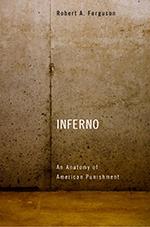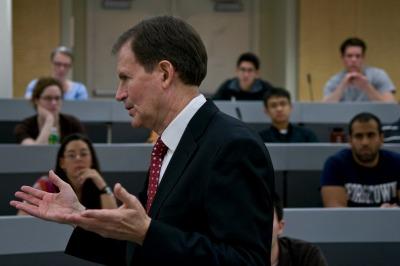The Plight of the Punished
Columbia Law School Professor Robert A. Ferguson Critiques the U.S. Criminal Justice System and its Reliance on Mass Incarceration In His New Book, Inferno: An Anatomy of American Punishment.
New York, March 31, 2014—During a course on the art of legal persuasion, Columbia Law School Professor Robert A. Ferguson challenged his first-year students to decide individually on a specific sentence for the same hypothetical crime.
| Professor Robert A. Ferguson |
The students argued forcefully in favor of sentences ranging from six months house arrest to 20 years in prison for an identical set of facts and circumstances. These heated debates in his classroom, Ferguson realized, meant that educated people in general had strong ideas about punishment without quite realizing what the actual imposition of a sentence might mean in practice. Here, in effect, were discrepancies that pointed to the growing severity of sentencing structures in courts across the United States.
Troubled by the seeming confusion over what punishment is and should be, Ferguson embarked on a sweeping investigation of America’s criminal justice system, digging into court records and related works of philosophy, history, psychology, sociology, and literature. That research led to his latest book, Inferno: An Anatomy of American Punishment, a diagnosis of out-of-control punishment regimes that was published this month.
“Americans like to punish,” but they don’t know what punishment means, Ferguson said recently, describing his latest work from his office in Jerome Greene Hall.
In Inferno, Ferguson hopes to expose the general public to the brokenness of the U.S. criminal justice system, which incarcerates 1 out of every 143 people and subjects prisoners to overcrowding, rampant gang activity, rape, and unchecked violence.
“People think of punishment as a length of time,” said Ferguson, the George Edward Woodberry Professor in Law, Literature, and Criticism. “They don’t ever think about what happens to people while they’re in prison. We need a new definition of punishment that recognizes the worth of the person being punished—regardless of whether that person will ever be released from prison.”
The interdisciplinary approach Ferguson used for his book has long been a staple of his classes, which are some of the Law School’s most popular. He holds a joint appointment in Columbia University’s Department of English and Comparative Literature and focuses much of his work on the study of American culture through law, literature, and history.
In a recent session of the seminar he developed based on his Inferno research, Punishment: Theory and Practice, Ferguson and his students discussed 18th century Italian philosopher Cesare Beccaria’s On Crimes and Punishments; 20th century French philosopher Michel Foucalt’s Discipline and Punish: The Birth of the Prison; and Baze v. Rees, a 2008 U.S. Supreme Court case upholding a three-drug lethal injection procedure in capital punishment.
The professor has an easy rapport with his students—before class, he dispensed wedding day advice to a soon-to-be-bride (“It’s the one day in your life you’re entitled to be selfish.”), discussed a Belgian waffle-maker’s value as a gift (“Many households are missing one.”), and made a fashion statement about hats (“I don’t wear them myself, but I buy them for my wife.”). He calls on students by name and insists that they do as well so they get to know one another.
| Professor Ferguson in the classroom |
Despite the early hour of the seminar and the difficult subject matter, Ferguson elicited discussion effortlessly once class began, illuminating Americans’ inconsistent response to criminal justice outcomes.
“People will line up with candles for a capital punishment issue, but they don’t even blink an eye when someone is put away for life,” he said.
He pointed out that only one justice joined Chief Justice John G. Roberts, Jr.’s opinion affirming the three-drug procedure in Baze in its entirety. Meanwhile, five concurring opinions were filed in addition to one dissent. Ferguson pointed out that a concurring opinion actually hurts a decision more than a dissent. It says you have the right answer but the wrong logic in support of it.
“I gave you this case because it’s the perfect example of the messiness of punishment,” he said. “I think this is an opinion to conjure with. The justices are upset with each other, and they’re upset with each other because the punishment regime is out of sync.”
Ferguson said current efforts to reduce the prison population—such as the Department of Justice’s invitation to inmates convicted under old crack sentencing laws to petition for early release—are laudable initiatives but actually “a drop in the bucket, and the bucket has a hole in the bottom of it.”
He said he hopes his book will draw attention to the plight of the punished and help move the system toward a more restorative model of punishment.
“My generation has failed at this,” he told his students. “Maybe your generation can succeed.”


